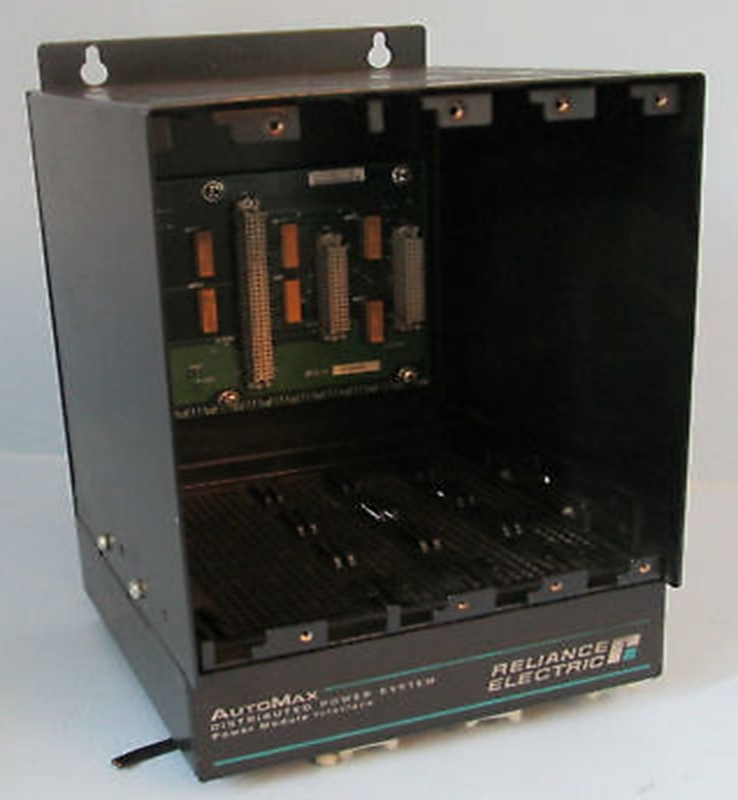Reliance 57409-E Multi-Function Processor Module
Brand:RELIANCE Model number:57409-E
Country of origin: United States Product weight:0.55kg
HS code:9032899099
Product Details:
Product Dimensions:
RELIANCE Multi-Function Processor Modules, historically offered by Reliance Electric (and now part of Rockwell Automation's legacy product lines, particularly within systems like AutoMax), were the central processing units of their industrial control systems. These modules were designed to execute complex control algorithms, manage I/O, and facilitate communication, enabling automated operation of diverse industrial processes.
Product Details
Core Function: These modules served as the "brain" of the control system, running the user-defined program to monitor inputs, process logic, and control outputs. They were engineered to handle various control functions within a single module.
Architecture: Typically, these modules were designed for rack-based systems (e.g., AutoMax racks), allowing for modular expansion with various I/O, communication, and other specialized modules. Some later versions might have also been PC-card based for integration into industrial PCs.
Multi-Processing & Multi-Tasking: A key feature was their ability to support multi-processing (adding multiple processor modules within the same rack for increased power) and multi-tasking (allowing the operating system to execute multiple programs or "tasks" concurrently based on priorities). This enabled breaking down complex applications into manageable, logical parts.
Programming Languages: Users typically had a choice of programming languages to suit different application requirements, such as Ladder Logic (for sequential control), Control Block (for continuous control), and sometimes enhanced BASIC for more complex calculations or data manipulation.
Communication Capabilities: These modules were equipped with interfaces to communicate with other control units, I/O systems (including remote I/O networks), human-machine interfaces (HMIs), and supervisory systems via proprietary networks (e.g., DCS-Net, R-Net) and standard industrial protocols.
Product Parameters (Typical, can vary by specific model e.g., AutoMax 57C430, 57C560)
Processor Type: Often based on robust industrial microprocessors (e.g., Motorola 68k series, Intel 801 in older AutoMate models).
Memory:
Application Memory: Typically ranging from hundreds of kilobytes to several megabytes for user programs and data.
System Memory: For the operating system and internal functions.
Processing Speed: Measured in terms of execution speed for control loops and logic. While specific clock speeds might not be readily available for all historical models, they were optimized for real-time industrial control.
I/O Capacity: The number of I/O points that a single processor could manage directly or via networked I/O modules could vary significantly, from dozens to thousands of points.
Communication Ports:
Network Interfaces: Proprietary industrial networks (DCS-Net, R-Net), and potentially later models with standard Ethernet (Ethernet/IP) or serial ports (RS-232, RS-485).
I/O Bus Interfaces: For connection to local or remote I/O modules.
Power Requirements: Typically 24V DC or 120/240V AC, depending on the system design.
Physical Form Factor: Designed for industrial rack mounting or sometimes as PC plug-in cards.
Diagnostic Indicators: On-board LEDs (e.g., OK, Fault, Network Status) for quick visual diagnostics.
Product Advantages (Historically & Generally for Multi-Function Processors)
High Performance: Capable of executing complex control logic and computations in real-time, crucial for demanding industrial applications.
Robustness & Reliability: Engineered for harsh industrial environments, with designs focused on high uptime and resistance to electrical noise, temperature extremes, and vibration.
Scalability: The modular nature of the systems they belonged to allowed users to add processing power (multi-processing) and I/O capacity as application needs grew, often without rewriting existing software.
Flexibility in Programming: Support for multiple programming languages allowed engineers to choose the most efficient method for different parts of an application.
Distributed Control Capabilities: Enabled the distribution of control functions across multiple interconnected processor modules, improving system performance and resilience.
Integrated Diagnostics: Built-in diagnostics and status indicators facilitated easier troubleshooting and maintenance.
Remote I/O Capability: Allowed I/O modules to be placed closer to the equipment, reducing wiring costs and simplifying installation.
Important Considerations
Legacy Status: Many of these RELIANCE Multi-Function Processor Modules are now considered legacy or obsolete products, particularly after Reliance Electric's integration into Rockwell Automation. While replacement parts might still be available from specialized vendors, long-term support and availability of new modules can be a challenge.
Software Compatibility: Programming and configuration require specific, often older, software tools and operating systems that might not be readily compatible with modern computing environments.
Migration Planning: For critical applications still using these modules, planning for migration to current generation control platforms (e.g., Rockwell Automation's ControlLogix, CompactLogix) is highly advisable to ensure future support, cybersecurity, and access to modern features.
Technical Expertise: Maintaining and troubleshooting these older systems often requires specialized knowledge of their unique architecture and programming environments.
Spare Parts: Building a sufficient inventory of spare parts (modules, power supplies) is crucial due to their legacy status.
Product Applications (Historical & Typical for such modules)
RELIANCE Multi-Function Processor Modules were widely used in various heavy industrial applications, including:
Metals Industry: Steel mills, aluminum production, rolling mills for precise control of processes like strip tension, furnace control, and material handling.
Paper and Pulp Industry: Control of paper machines, stock preparation, and finishing lines.
Automotive Manufacturing: Assembly line control, body shop automation, paint shop systems.
Chemical Processing: Batch control, continuous process regulation, safety interlocks.
Power Generation: Turbine control, generator synchronization, balance-of-plant control.
Mining and Minerals: Conveyor control, crushing, and sorting operations.
Water and Wastewater Treatment: Control of pumps, valves, and treatment processes.
Specialty Machinery: Integrated into custom-built machines requiring high-performance, multi-functional control.

We have the same series of models in stock. If you don't find the model you need, please contact us and we will provide you with an official quotation!
RELIANCE ELECTRIC 86466-60V
RELIANCE ELECTRIC 615055-2V
RELIANCE ELECTRIC 0-54374
RELIANCE ELECTRIC 86474-8S
RELIANCE ELECTRIC 45C344
RELIANCE ELECTRIC 57C443
RELIANCE ELECTRIC 0-49005-5
RELIANCE ELECTRIC 78177-2RC
RELIANCE ELECTRIC P56H1440-S-RU
RELIANCE ELECTRIC 57409-E
Colour:new Warranty: 12 months
Lead Time:3-day working day Price: Please contact us
Shipping Port: Xiamen, China Payment:T/T
Express cooperation: fedex, DHL, UPS and your express account
Service: Professional Sales provides 24 hours /7 days online service
Our service:

Fast delivery, and can be used with your express account.

Competitive Price

Free Shipping

One-year warranty